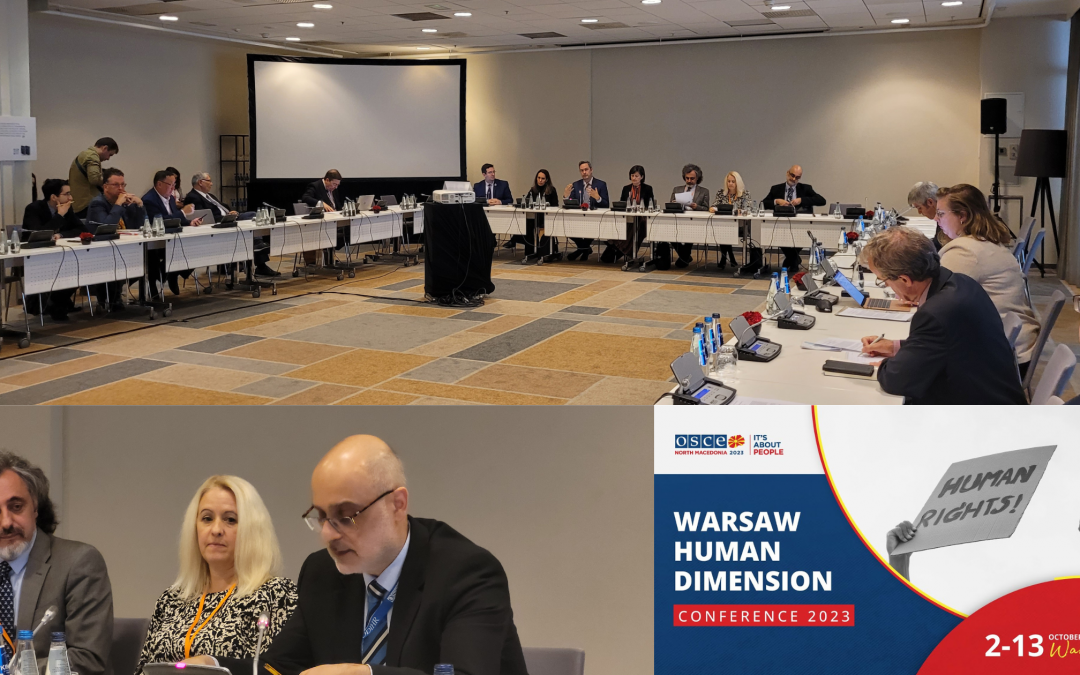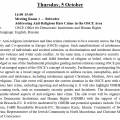Organized OSCE Office for Democratic Institutions and Human Rights WARSAW HUMAN DIMENSION 2023
Summary: Anti-religious intolerance and hate crimes continues to be a concern across the Organization for Security and Co-operation in Europe (OSCE) region. Such manifestations of intolerance threaten both the security of individuals and societal cohesion, as discrimination and intolerant discourse often escalate into violence and wider scale conflict. At the same time, a comprehensive security regime is also needed to fully respect, protect and fulfil freedom of religion or belief, which is specifically acknowledged as one of the fundamental principles guiding mutual relations among OSCE participating States and an integral aspect of the OSCE’s concept of security. Furthermore, participating States of the OSCE have agreed on a broad range of commitments to address racism, xenophobia, anti-Semitism, discrimination and intolerance, including intolerance against Christians, Muslims, Jews, and members of other religions.
By Christine Mirre OSCE 2023
First, I would like to underscore the great value of the considerable amount of work that ODIHR has done to combat hate crimes in our European societies through a range of programs and resources.
In my NGO’s field of expertise, which is freedom of religion or belief, with a special focus on religious minorities, these tools are very precious to us.
Today, I’d like to highlight a European phenomenon that leads to intolerance, stigmatization, and discrimination against religious minorities, which can ultimately result in hate crimes, and the various actors involved in this phenomenon.
First, what do I mean by “religious minority“?
I mean new or non-traditional religious mouvements, identified by the notorious and stigmatizing term: sect or cult.
Recently the European Court of Human Rights condemned Bulgaria, stating that calling a religious minority a “cult” exposes it to negative consequences and that such slanderous language should be avoided by public authorities.
At the root of this discrimination are the “anti-cultists“, which are in fact either individuals, apostates, or anti-cult associations under the umbrella of a European federation.
The misuse of this derogatory label without restraint by anti-cultists and the media, cause a lot of damage to these religious minorities and their members.
The media have their share of responsibility in this damage when out of sensationalism they fail to check and echo the false accusations of the anti-cultists, spread their fake news, create a climate of suspicion and hostility leading sometimes to hate crimes.
Unfounded accusations also shape the ideas of political decision-makers, and they may be officially endorsed by some democratic states and their institutions.
It is the case in Germany, Austria, France or Belgium.
This climate of intolerance and hate was clearly denounced in the last report of USCIRF (United States Commission on International Religious Freedom).
In the section devoted to anti-cultism, it stressed that “several governments in the EU have supported or facilitated the propagation of harmful information about certain religious groups“.
To sum up:
- anti-cultists create from scratch cults that they describe as “dangerous or harmful to society”,
- the media, which thrive on sensationalism rather than facts, seize on the cult issue as a good topic because that boosts the sales or the audience,
- the States, misinformed by anti-cultists, feel obliged to protect their citizens from this scourge, and create exceptional laws and specialized repressive bodies, such as the Miviludes and the “cult police” in France.
When these groups are labeled as “dangerous to society” by the media and state institutions, it sends a signal to some unstable minds that getting rid of these dangerous elements is a legitimate “civic” act.
We have received numerous reports of:
- vandalism of places of worship of Jehovah’s Witnesses in Italy,
- anonymous bomb threats,
- armed individuals entering in a Church of Scientology in France,
- and the shooting of 7 Jehovah’s Witnesses in Germany.
We identified a specific type of hate crime affecting women related to their involvement in religious minorities:
– Women reported harassment by husbands and families after joining a religious group.
– Cases of husbands forcibly removing wives from places of worship and harassing them at work.
– Husbands seeking divorce on the grounds that their wives have been manipulated by cult leaders.
– And the case of a woman whose husband sought “exit counseling” from an anti-cult association.
This phenomenon and intolerance towards religious minorities does not exist in countries where there is NO anti-cult organization.
Taiwan, where I was recently invited to participate in an international forum on religious freedom, is a good example in this regard: I did not find any victim of false information, discrimination, hate speech or hate crimes.
Nothing as such is reported in the Taiwanese media, and consequently no unfounded government attitudes and policies towards such groups.
In conclusion, to eradicate the spread of intolerance and hate crimes against religious minorities, I would recommend that:
- The ODIHR organize workshops for journalists and media people about how to cover issues related to religious minorities,
- Media outlets follow internationally recognized ethical standards,
- States refrain from stigmatizing specific religious or belief minorities.




